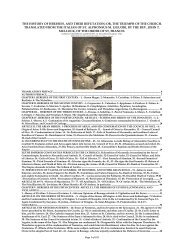The Writings of St. Francis of Assisi - + Saints' Works
The Writings of St. Francis of Assisi - + Saints' Works
The Writings of St. Francis of Assisi - + Saints' Works
You also want an ePaper? Increase the reach of your titles
YUMPU automatically turns print PDFs into web optimized ePapers that Google loves.
Chapter VI<br />
THE WRITINGS OF ST. FRANCIS OF ASSISI<br />
On the friars' recourse to their ministers and that no friar is to be called Prior 388<br />
Let the friars, in whatever places they are, if they cannot observe our life, have recourse,<br />
as soon as they are able, to their minister, pointing this out to him. · Indeed let the minister strive<br />
to provide for them in such a wise, just as he would want to be done for himself, if he was in an<br />
exactly similar situation. · And let no one be called Prior, but let all be called in general 'Friars<br />
Minor.' 389 · And let "one" wash "the feet <strong>of</strong> the other" (cf. Jn 13:14).<br />
Chapter VII<br />
On the manner <strong>of</strong> serving and working<br />
Let all the friars, in whatever places they have stayed among others to serve or work, not<br />
be chamberlains nor chancellors nor preside in the houses in which they serve; nor let them<br />
receive any <strong>of</strong>fice, which generates scandal or "is detrimental to their soul" (cf. Mk 8:36); · but<br />
let them be lesser and subject to all, who are in the same house.<br />
And let the friars, who know how to work, work and exercise the same art, which they<br />
know, if it has not been contrary to the salvation <strong>of</strong> (their) soul 390 and one will be able to work at<br />
it honestly · For the prophet said: "Laborers, you shall eat <strong>of</strong> your own fruits ; blessed are you<br />
and well it shall be for you (Ps 127:2 — Rom. Psalter): · and the Apostle: "Let him who does not<br />
want to work," not "eat" (cf. 2 Th 3:10); · and: "Let each one remain continually" in that art and<br />
<strong>of</strong>fice, "in which he was called" (cf. 1 Cor 7:24). · And for (their) work let them be able to<br />
receive every necessary thing besides money. · And when the necessity has arisen, 391 let them go<br />
about for alms as the other poor (do). · And let it be licit for them to have iron tools and<br />
instruments suitable for their art.<br />
Let all the friars 'strive to sweat 392 at good works,' because it is written: · Always 'do<br />
something' good, 'so that the devil may find you occupied.' · And again: Idleness is the enemy <strong>of</strong><br />
the soul. · For this reason the servants <strong>of</strong> God ought to always pursue prayer or some good work.<br />
Let the friars beware <strong>of</strong> themselves, wherever they have been, in hermitages or in other<br />
places, that they appropriate no place for themselves nor defend it against another. · And<br />
whoever has come to them, friend or adversary, thief or brigand, let him be kindly received. ·<br />
And wherever the friars are and in whatever place they have come upon one another, they ought<br />
to spiritually and diligently look upon themselves and honor "each other without murmuring" (1<br />
Pet 4,9). · And let them beware <strong>of</strong> themselves, that they not show themselves to be sad outwardly<br />
388 lit. "first." A "prior" was one <strong>of</strong> the <strong>of</strong>fices in a monastic community immediately under an<br />
abbot. <strong>St</strong>. <strong>Francis</strong> wanted this title excluded from his Order so as to promote a spirit <strong>of</strong> humility<br />
among the friars.<br />
389 For the meaning <strong>of</strong> this name see fn. 255.<br />
390 i.e. so long as the work has not been the occasion <strong>of</strong> their moral degradation, cf. XVI<br />
constitution <strong>of</strong> the Fourth Lateran Council, (1215 A.D.).<br />
391 lit. cum necesse fuerit, "when it has been necessary." Here "necessity" refers to "alms."<br />
392 i. e. work up a sweat; "strive earnestly and generously." This quote is taken from Pope <strong>St</strong>.<br />
Gregory the Great, Hom. XIII in Ev., PL 76,1123; the next saying is taken from <strong>St</strong>. Jerome,<br />
Epistola 125,11; and the third is from the Rule <strong>of</strong> <strong>St</strong>. Benedict, XLVIII,1.<br />
Page - 88













